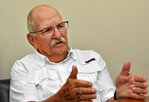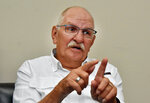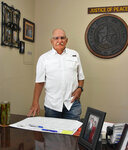




Oscar “Hap” Howell — the “Hap” was short for “Happy” — was an uneducated man where formal schooling was concerned, but he was the wisest man his youngest son has ever known.
It was from Hap that Roger “Cotton” Howell, Hood County’s justice of the peace for Precinct 1, learned that integrity “is who you are when nobody’s looking.”
“My dad was an amazing man,” said the three-term elected official.
During his years on the bench, Cotton, who asked that he be referred to throughout this article by his first name, has possibly been watched more, and by more people, than his father ever was. It’s probably safe to say that with every case presented in his court, one party, maybe even both, left unhappy with his decision or with the way he ran his court. But in a county where politics is a rough-and-tumble game, Cotton has developed a reputation for refusing to play. He has not been soiled by mudslinging, perhaps because he has refused to engage in it.
In more ways than one, his departure at the end of his term will be the end of an era.
By his own admission unsavvy in the ways of social media, the former longtime rodeo judge chose a recent Commissioners Court meeting rather than a Facebook post to announce that he will not seek re-election. He stated that he was making the announcement as a courtesy so that anyone wanting to seek that office would have time to prepare and mount a campaign.
The filing period for the 2024 spring primary election will open on Saturday, Nov. 11 and run through Monday, Dec. 11.
Although the filing period is still months away, some have already announced their intention to run for public office. County offices that will be on the ballot in 2024 are district attorney; county commissioner, precincts 1 and 3; sheriff; tax assessor-collector; county attorney; peace justices for precincts 1 and 4; and constables for all four precincts.
As he prepares to head home to his woodshop and his wife Carolyn, Cotton is also preparing to leave the staff on whom he relies: office manager Sissy Freeman, clerk Cameron Cozart and part-time clerk Courtney Robbins.
“Whatever gold sold for this morning, they’re more valuable to me, and to the county, than that,” he said of the women.
Probably few people, including Cotton, would have thought that the youngest child of Hap and Beulah Howell would one day wear a judge’s robe. Hap had only a third-grade education because he was forced to work the family farm after his father died. Beulah had only a sixth-grade education.
Cotton, 71, was more fortunate. He completed all 12 grades in public school. He also had a couple years of college under his belt when he took office in January 2013. He speaks candidly about things in his background that made him an unlikely candidate for a robe and a gavel.
Before taking the bench in the JP courtroom at the Ralph H. Walton Jr. Justice Center, Cotton appeared at the counter of the justice of the peace office more than once to pay traffic fines related to rushing his kids and niece from one rodeo to another. He remembers paying a $186 traffic ticket at former longtime JP Martin Castillo’s office, who later became his friend and colleague.
Roads, both literally and figuratively, have played an important part in Cotton’s life.
Years ago, while driving to Groesbeck in his pickup truck, Cotton, whose first marriage had ended in divorce, suddenly pulled over to the side of the road and prayed for God to take control of his life.
It was truly a “Jesus, Take the Wheel” moment, but for Cotton, it wasn’t a joke or a corny country song. He meant it.
When Cotton pulled back onto the road, he knew his life was going in a different direction.
HUMBLE BEGINNINGS
Cotton was born and raised in Albuquerque, New Mexico. He was the youngest of four children. His now-deceased sister Ann was the oldest of the siblings. Oldest brother Dean is also deceased, but Wayne, an equine veterinarian known as “Doc,” is alive and well and, on one occasion, rang up his little brother as Cotton was delivering a guest sermon at Triple Cross Cowboy Church.
As for Cotton’s childhood, it was happy, and he knew he was loved. His nickname came from his white hair and the fact that a family friend always affectionally referred to him “Little Cotton Picker.”
“I had the best parents in the world,” Cotton said of his upbringing. “You know, they were just common farmer-country people. But my mom and dad both had integrity. We didn’t go to church, or anything like that, but they instilled the idea that there was a God and that his son was Jesus Christ, our Lord and savior. And I grew up with that, not that I paid much attention to it most of my life, but it was always there.”
Cotton left Albuquerque immediately after graduating from high school.
“I graduated on a Friday night. Saturday morning, I got on an airplane to Ocala, Florida to exercise racehorses,” he said. “Somebody in our family always had racehorses.”
In 1970, Hap and Beulah’s boy joined the U.S. Marines, serving until 1974. He was stationed in Japan, Vietnam, and the New River Air Station in North Carolina where he participated in rodeos through a regional rodeo association.
Cotton bought a “car act” from a rodeo clown who was getting out of the business and worked as a rodeo clown for the next three or four years.
“I really enjoyed that,” he said. “You get a chance to just be goofy and get paid for it.”
After a while, though, Cotton missed competing. He started riding saddle broncs in rodeos.
Upon leaving the Marine Corps and the rodeo association, Cotton moved to Oklahoma. He attended Oklahoma state for a couple of years but left college to shoe horses. He eventually went back into the racehorse business, living near the Texas-Louisiana border not far from Delta Downs.
When the 69th Texas Legislature enacted the Texas Racing Act in 1986, establishing the Texas Racing Commission, Cotton moved to Granbury to be near Trinity Meadows Race Track in Willow Park.
Eventually, he left the shoeing and racehorse business and took a different road, doing something completely different. He went to work for Hood County in the maintenance department.
WINDING ROAD
As a member of the county’s maintenance team, Cotton had a chance to visit every county office. By doing so, he met county employees. He saw them working and learned about their departments.
In 2012, the JP office that served Precincts 1 and 2 split, creating the need for an additional peace justice to serve the growing county. Cotton’s friends from the county encouraged him to run for the seat, he said. After some thought and prayer, he decided to do it. He beat a Republican challenger in the primary and went on to win the November election in a county where there is rarely a Democratic candidate on the ballot.
It was an odd turn of events, but in Cotton’s view, it was just another result of that spontaneous pullover on the road to Groesbeck.
He can’t tell you the day or the year that it happened, but he still remembers which tree he stopped under. Although he was attempting to live as a Christian, he had never prayed for God to come into his life.
A few missteps along the way almost cost Cotton his driver’s license but he still has his marriage license. He and his beloved Carolyn have been married for more than 30 years.
Cotton helped raise his stepson, David Sanford, from the time the boy was 11. Sanford is now a game warden in Louisiana raising a son, Marcus, with his wife, Kizzy.
Cotton’s son Shawn owns a tap room in Fort Worth. He and his wife Margaret have two sons, Kingston and Ivan.
With less than a year and a half to go until he heads home for good, the peace justice knows that life always goes on. Work in the JP-1 office will continue with a newly elected official at the helm.
“I’ll miss these folks,” he said of his staff and others who work for the county. “This has been a great job. This has probably been the best job I’ve had my whole life. There’s been a couple of people that have put things on Facebook about, you know, they wish they’d find me in a bar ditch somewhere. But that’s okay. That’s their prerogative. But I’ve enjoyed working here. I’m blessed.”